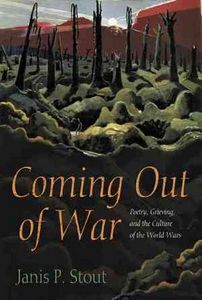American and British poetry, music, and visual art born of World Wars I and II.
World War I is widely considered “the Great War” and World War II, “the Good War.” Janis Stout thinks of them as two parts of a whole that continues to engage historians and literary scholars searching for an understanding of both the actual war experiences and the modern culture of grief they embody. Poetry, of all the arts, Stout argues, most fully captures and conveys those cultural responses.
While probing the work of such well known war poets as Rupert Brooke, Wilfred Owen, and Randall Jarrell, Stout also highlights the impact of the wars on lesser studied, but equally compelling, sources such as the music of Charles Ives and Cole Porter, Aaron Copland and Irving Berlin. She challenges the commonplace belief that war poetry came only from the battlefield and was written only by men by examining the wartime writings of women poets such as Rose Macaulay, Marianne Moore, Elizabeth Bishop, and Gwendolyn Brooks. She also challenges the assumption that World War II did not produce poetry of distinction by studying the work of John Ciardi, Karl Shapiro, Louis Simpson, Robert Frost, and Wallace Stevens. While emphasizing aesthetic continuity between the wars, Stout stresses that the poetry that emerged from each displays a greater variety than is usually recognized.
A final chapter considers Benjamin Britten’s War Requiem as a culmination and embodiment of the anti-war tradition in 20th-century poetry and music, and speculates on the reasons why, despite their abundance and eloquence, these expressions of grief and opposition to war have effected so little change.
Janis P. Stout is Professor Emerita of English and Dean of Faculties Emerita at Texas A&M University. She is the author or editor of several works, including Willa Cather and Material Culture, Katherine Anne Porter: A Sense of the Times, and Through the Window, Out the Door: Women’s Narratives of Departure, from Austin and Cather to Tyler, Morrison, and Didion.
| LoC Classification |
PR605.W65S76 2005 |
| Dewey |
821/.9109358 |
| Nationality |
Assorted |
| Pub Place |
Tuscaloosa AL |
| Dust Jacket |
dj |
| Cover Price |
$47.50 |
| No. of Pages |
296 |
| Height x Width |
9.1
x
6.2
inch |
| First Edition |
Yes |
|
|
| Conflict |
20th Century Misc. |
|
Synopsis/Annotation: American and British poetry, music, and visual art born of World Wars I and II. World War I is widely considered “the Great War” and World War II, “the Good War.” Janis Stout thinks of them as two parts of a whole that continues to engage historians and literary scholars searching for an understanding of both the actual war experiences and the modern culture of grief they embody. Poetry, of all the arts, Stout argues, most fully captures and conveys those cultural responses. While probing the work of such well known war poets as Rupert Brooke, Wilfred Owen, and Randall Jarrell, Stout also highlights the impact of the wars on lesser studied, but equally compelling, sources such as the music of Charles Ives and Cole Porter, Aaron Copland and Irving Berlin. She challenges the commonplace belief that war poetry came only from the battlefield and was written only by men by examining the wartime writings of women poets such as Rose Macaulay, Marianne Moore, Elizabeth Bishop, and Gwendolyn Brooks. She also challenges the assumption that World War II did not produce poetry of distinction by studying the work of John Ciardi, Karl Shapiro, Louis Simpson, Robert Frost, and Wallace Stevens. While emphasizing aesthetic continuity between the wars, Stout stresses that the poetry that emerged from each displays a greater variety than is usually recognized. A final chapter considers Benjamin Britten’s War Requiem as a culmination and embodiment of the anti-war tradition in 20th-century poetry and music, and speculates on the reasons why, despite their abundance and eloquence, these expressions of grief and opposition to war have effected so little change. nbsp; Janis P. Stout is Professor Emerita of English and Dean of Faculties Emerita at Texas A&M University. She is the author or editor of several works, including Willa Cather and Material Culture, Katherine Anne Porter: A Sense of the Times, and Through the Window, Out the Door: Women’s Narratives of Departure, from Austin and Cather to Tyler, Morrison, and Didion. “The most extraordinary feature of this study is its amazing scope. . . . Even for readers familiar with the terrain of 20th-century English war poetry, this book contains a treasure trove of new and interesting work. The same could be said for the exhaustive scholarship brought to bear on the discussion of the literature to excellent effect. . . . Some of its inclusions are very likely to spur new interest and new research. For example, the brief discussion of Sterling Brown’s poetry should make readers curious to learn more about the African American response to the First World War.”--Margot Norris, author of Writing War in the Twentieth Century “It is hard for me, as a reader, to contain my praise. This study of the poetries of the great wars of the 20th century in their relation to what Stout calls the culture of mourning is comprehensive and masterful. It is immensely learned, yet readable. Most important, the book is intensely wise and humane, distilled from a career of reading and writing and meditating on the meanings of art forms and expressions.”--Philip Beidler, author of Late Thoughts on an Old War: The Legacy of Vietnam
